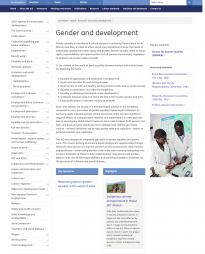Equitable Social & Gender Environment for Artisanal Fish Smoking
Artisanal fish smoking and marketing is often undertaken by women. There is often a gender division of labour associated with small-scale fishery operations. For example, in West Africa, it is traditional for women to process and market fish. While women are often forbidden from going fishing, they derive substantial status and income for their households from processing activities. Women, such as these, in a developing country context, require appropriate technology and gender sensitive services to be easily accessible to them so they can also carry out other activities such as childcare, cooking, and gardening.
In order for artisanal women fish processors to maximize their potential and adopt measures which will reduce food loss and waste (FLW) the following are some of the basic requirements:
- Strong and beneficial role played by extension services in order to transfer appropriate technology, innovation, skills and knowledge
- Existing community power structures involved within the communities to facilitate interventions
- Government policy should result in gender sensitive government development Officers who coordinate local activities biased towards women
- Organized groups, such as cooperatives societies, facilitate support by extension agents who can more easily provide them with useful information and advice
- Fish processors should be encouraged to join existing cooperatives or form new ones that could qualify them to receive assistance from governments and commercial banks
- Access to capital to enable them to invest in new technology e.g. revolving loan schemes
Key Publications
Women and Agroprocessing in Africa Study on the state of small agribusiness women in fish smoking in the Central Region of Ghana and possible ways that can be adopted to improve their livelihoods. | |
Good Practice Policies to Eliminate Gender Inequalities in Fish Value Chains This FAO publication highlights key gender inequalities in fisheries and aquaculture value chains that lead to underperformance by women, and proposes good practice policies that can lead to increases in production and processing of high-quality fish. | |
Overview of role of gender in the work place and an introduction to an integrated approach to gender equality and decent work with a link to further resources. |
More Resources
More Resources
27 February 2024
31 October 2023














